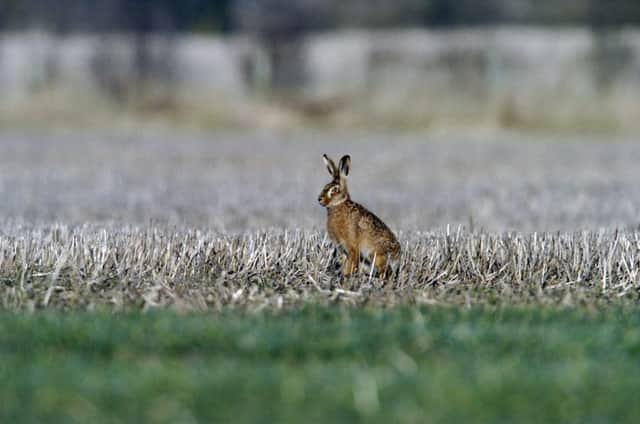Readers' letters - April 1


People are a fickle species and one minute an issue is ‘fashionable’ and the next it is not, then it all changes around again. Alas, being concerned about the environment is, currently, unfashionable.
We nature lovers, whether we care about the countryside or are concerned about fracking, are apparently ‘NIMBYs’ and ‘anti-progress’. Yes, my local area is ‘sort of’ my backyard but the rainforests certainly aren’t and I am even more concerned about the destruction of them.
Advertisement
Hide AdAdvertisement
Hide AdStill, needs must, say the developers. If humans need houses, shops and buildings then that is what must happen.
But who cares about the cost to other species when their habitat is lost, our own happiness or indeed, our own physical and mental health (studies have shown nature is beneficial for happiness and health)?
Habitat loss is a major issue when it comes to wildlife, and one of many species being affected is brown hares, disappearing as fast as their habitat.
According to Lancashire, Manchester and N Merseyside Wildlife Trust, over 80 per cent of Britain’s brown hare have disappeared in the last century. The trust says their natural habitat is being lost due to an increase in roads, houses and fencing. And when huge areas of hedgerow is lost, the brown hares also lose their food and shelter.
Advertisement
Hide AdAdvertisement
Hide AdStill, if environmental issues are unpopular now, my hope is that one day it will become ‘on trend’ for both voters and politicians. We can compromise and start thinking of moderate – rather than excessive –house building, renovating and transforming empty/derelict buildings, and bringing the countryside into the city, making our urban environment more natural and attractive. I look forward to that time of enlightenment.
Jane via email
politics
Leaving good for farmers
Farmers are complaining about the prices they get for their hard work, the EU’s ‘red tape’ and much else but, given the chance for a new, fairer deal by leaving the EU in June, many say they will reject it and stay with what they have.
The Common Agricultural Policy (CAP) was not designed to help British farmers and takes little notice of the very different methods used in the UK compared to much of the rest of Europe. It has been said to hinder, not assist.
One of the farmers’ biggest worries seems to be the loss of farming subsidy if we leave but George Eustice, the UK’s Farming Minister, has confirmed subsidies will not only be maintained outside the EU but actually increased in many cases. This can be done because the CAP currently costs the UK at least £16bn per year. Some sources put it even higher at £18bn, but very little reaches our farmers in the UK.
Advertisement
Hide AdAdvertisement
Hide AdThe bulk of it is spread around the remainder of the EU. Once we stop sending it abroad, we will not only reduce the tax burden but be able to increase these payments to our farmers. All this, and far less ‘red tape’ which merely reduces efficiency and increases costs.
There are other benefits too.
Outside the EU, animal welfare can be vastly improved including increasing the maximum penalty for deliberate cruelty to animals, preventing testing by companies on animals and banning the export of live animals for slaughter amongst many other improvements currently hard, or impossible, to enforce under EU rules.
Leaving the EU and returning to a British system, run for UK farmers and overseen by the UK government, as it was before we joined the EU, appears to be a ‘win-win’ situation for all involved. It is hard to see why many farmers are against the idea.
Malcolm Watson,
Address supplied